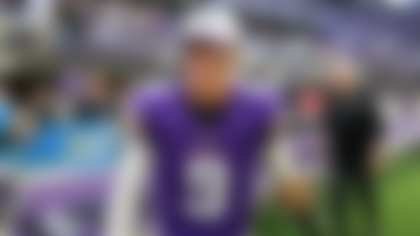There was never even an attempt to hide the game plan in Houston over the past few years. All you had to do was ask Texans head coach Bill O'Brien and he'd tell you:
Get the ball to All-Pro wide receiver DeAndre Hopkins as often as possible. Open or not, throw it his way.
Now, there's a new game plan in H-Town.
Hopkins was traded to the Arizona Cardinals as free agency began. More than one Texans teammate told me after the deal went down that Hopkins "put the team on his back" many times over the last few seasons. It's extremely difficult for any player other than a quarterback -- and especially so for a receiver -- to carry a team, but it's hard to argue Nuk didn't. During his seven-year tenure in Houston, Hopkins played with a carousel of quarterbacks, was still absolutely dominant, and the team won the AFC South four of the last five years. If anyone closely examines the roster that surrounded Hopkins while he was putting up ridiculous numbers, year in and year out, it's hard to argue he's not the best receiver in the game today.
When the Texans take the field in 2020 for the first time without Hopkins since 2012, the idea is that no one skill player should be put in a position where he will have to carry the load himself. Collectively, the offense will be balanced, the ball distributed -- if you get open, Pro Bowl quarterback Deshaun Watson, one of the few players in the league who is actually capable of carrying a team on his back, will get it to you.
"I look at it from the standpoint of, first and foremost, you talk about a guy in Hopkins who is just a special player," newly acquired wide receiver Brandin Cooks told me in a recent Zoom interview from his home in California. "So you look at it and there's no question on why you want to continue to get the ball to him, because he makes things happen. But now I think what we have is we have so many special guys in this room who can do it all. One of the biggest things I've always thought as a receiver is when you're stacked on a team with multiple receivers, you have a better chance of winning consistently and going far, because you can never just key on one guy. I think that unselfishness in the room I feel for the guys already is going to do us justice in the long run for sure."
This offseason the Texans have essentially exchanged Hopkins for the collective group of Cooks (whom they traded for), receiver Randall Cobb (free-agent signee) and running back David Johnson (arrived in the Hopkins deal). This year, Watson will drop back and have a track team of three sub-4.4 receivers in Cooks, Will Fuller V and Kenny Stills. In the middle of the field, he'll have the first true slot receiver in the O'Brien era (Cobb), a deep collection of tight ends who produced nine touchdowns last season and Johnson, who was one of the best pass-catching backs in the NFL a few seasons ago.
"We've got a great quarterback, a guy who's going to be able to distribute the ball and again get the ball to the guys that are winning, and we've got guys who have won consistently for a long time scattered throughout that room," offensive coordinator Tim Kelly said Friday. "You look at Brandin, you look at Randall, you look at Will and Kenny, obviously, with the production they had last year.
"I think when you look at the people that we have in our offensive unit room right now, you've got a lot of explosive players there for us, guys that have unique skill sets, guys that are experienced and guys that have produced at a high level in this league. It's an exciting thing to be able to kind of sit back and watch those guys come together throughout this virtual offseason and learn the offense and kind of come together as one unit."
O'Brien has acquired three receivers over the last year -- Cooks, Cobb and Stills -- and all have led an NFL team in receiving yards. All three also have experience in being part of a collaborative group of skill players, so you can assume they all are comfortable operating in such a system. Cobb spent eight of his previous nine NFL seasons as part of an ensemble in Green Bay. In six pro seasons, Cooks has four 1,000-yard campaigns and has never played on a WR corps where more than 154 yards separated the first- and second-leading receivers on the team. In each of the last five seasons, Hopkins led the Texans in yards and targets. During that stretch, he averaged 740 yards and 94 targets PER SEASON more than the next-highest receiver on the team. In 2018, Hopkins had 1,572 yards on 163 targets. The second-highest receiver on the Texans was Fuller with 503 yards on 45 targets.
That unevenness will no longer exist in Houston.
This will be a different offense not only with the personnel on the field, but O'Brien has handed over play-calling duties to Kelly. As Kelly, O'Brien and this offensive staff mold the new attack, they're taking the approach of listening to their new veterans. O'Brien has been outspoken that this season will be driven by veteran players more than any other in the past, due to the abbreviated offseason stemming from the COVID-19 pandemic.
As the Texans go through their virtual offseason, Cooks, Cobb and Johnson have all been communicating how they see certain aspects of the offense and how they have been used in the past in maybe a similar concept. The coaching staff has given these vets the ability to make contributions on how they see this offense -- and themselves within it.
"From a distance, you look at their offense and how creative they are," Cooks told me of Kelly's style. "The creativity that he has presented and how that allows players to be all over the field. Not just putting them in one specific role. When you see that as a receiver, you love that. You have the opportunity to run multiple routes."
Much of the success in Houston will fall on Watson. His new weapons haven't caught a single pass from him, but think the world of their new quarterback. Cobb saw similarities to his former signal-caller in Green Bay, Aaron Rodgers. Cooks believes Watson has many of the same characteristics as two of his former quarterbacks, Drew Brees and Tom Brady.
Of all of his remarkable traits, it's Watson's mind that could be relied on most this season. The safety blanket of Hopkins is gone. There will be multiple skill players operating in this offense for the first time. The success of this offense will be determined by how well Watson performs in the pre-snap phase -- lining up his personnel and communicating -- and how seamlessly he can go through his progressions to find the open man. Watson can't build chemistry on the field with his new targets just yet -- they are working on getting together soon -- but for now, they're building the foundation to their new relationship with one another virtually.
"He's a tough guy and a warrior," Cooks told me of Watson. "No matter what is going on, as long as the play is alive, he's never going to stop. But what I've felt right off the bat, is this guy is smart. Hearing the questions that coach asks him in these meetings and how quick he's able to just fire off the answers. It's really impressive. You think, as a young guy, he would struggle with some of that. But I got to tell you, he's right on the money every single time with questions being asked. That says a lot, especially at the quarterback position."
For all of this to work, players need to remain healthy. Cooks and Fuller have injury concerns -- losing one or both would be damaging to how the Texans operate as an offense. Cooks told me his concussions are not an issue moving forward, but other teams in the league passed on trading for him this offseason because of their concerns with his concussion history. Since 2017, Fuller has been active for just 29 of 51 games (including the playoffs). Hopkins, on the other hand, was always available, as he's missed just two games in his seven NFL seasons.
When healthy, Fuller is considered one of the league's top deep threats. The Notre Dame product finished with 670 yards last season. Only the Giants' Golden Tate had more yards (676) among guys who played fewer than 12 games in 2019. Hopkins has worked out with Fuller in Houston this offseason and said on his Instagram Live last month that the speedster should have already been voted to a Pro Bowl and will make the Pro Bowl this season. Also, every Texans player I spoke with believes Fuller clearly is a No. 1 wideout. Cornerbacks who have gone against him have told me his incredible speed actually overshadows the fact he's a complete receiver. O'Brien believes he's a great route runner and Watson has a remarkable amount of trust in him.
Watson throws one of the best deep balls in the game -- and with the immense speed of Cooks, Fuller and Stills, attacking defenses downfield will be a dynamic part of this offense. The Texans' thought process has always been that stretching the field in the passing game in turn also influences how their run game operates.
"Not just in the pass game, but if you want to include the run game, it puts the DBs and safeties back a little bit more, you know, for run fits," Watson said last December. "So, instead of gaining -- if a safety is supposed to run fit and be in that gap -- instead of gaining 3 yards, the running back's gaining 7, and those 4 extra yards are big. Especially with this day and age of football where defensive fronts are very, very stout in the run game. It really opens up a lot of different things."
That leads to another major question mark, to the player who came to Houston in the Hopkins trade: RB David Johnson. Making some calls, I was repeatedly told two schools of thought. Johnson is not the player we saw in 2016, when he rushed for 1,239 yards and caught 80 passes for 879 yards, leading the league with 20 total touchdowns. He's just not. The other perspective is that he didn't fit into what Kliff Kingsbury wanted to do, just didn't have a role in the Cardinals' offense. My understanding is Houston doesn't know if Johnson can be the player he was a few seasons ago. How would they? But they obviously hope so. With the deep threats they have, that should open up space for Johnson to operate in the run game as well as short passing game.
The Texans have always had an emphasis on their backs to catch the football and be a part of their passing game. They thought Duke Johnson actually did a pretty good job of doing that last year, but when you look at it, it's kind of all he can do. With David Johnson, the hope is that Houston can now line up a power back in the backfield and then split him out wide, and Johnson can go run a route against a linebacker in a mismatch situation. Again, we don't know if Johnson can be that guy again. If he can, the Texans believe his addition will make them extremely multiple as an offense and expand their play calling.
"When you have guys that are versatile and are both a vital running threat and a good receiving threat, it allows you to open up and be creative and find different ways to get guys the ball in space and do some good things," Kelly said.
Cobb will also have more room to operate out of the slot. Before spending last season in Dallas, Cobb had a connection with Rodgers in Green Bay specifically when plays broke down. That obviously is a strength of Watson's, and the same connection could be formed.
"A lot of the routes that were ran by the slot receivers are a lot of the stuff that I'm used to in my career," Cobb said after being signed by the Texans. "I've ran a lot of routes out of the slot, just being my primary position for most of my career. I think, obviously, when I played with Rogers my first eight years, a lot of what he did was late in the play, scrambling around, moving around and just being able to find ways to get open after the initial route and create separation and be a target and find a way to get open for him in those situations. I see a lot of the same characteristics in Deshaun, the way he's able to escape the pocket and keep his eyes downfield and find receivers."
There are a lot of questions that have yet to be answered. O'Brien wants fans to be patient before they evaluate all the moves that have been made.
"I would say let's review it a year from now, two years from now, three years from now. Let's let it all play out," O'Brien pleaded in his final media session before the draft.
Obviously, he's caught heat for the transactions he's decided to make since becoming the general manager of the team this offseason. Several have made fans and media members scratch their heads. But you can't deny that O'Brien has a generational quarterback. Houston has all five starters back on the offensive line and both tackle spots locked up for the next several seasons. Can the rest of the pieces fall into place to create a unit that is more explosive and productive after eliminating one of the most explosive and productive players in the game?
I guess we'll all just have to be patient. But not for too long. Houston plays the last two MVPs to start the season and five of their first seven games are against teams that just made the playoffs. So we might find out pretty quickly.
Follow James Palmer on Twitter @JamesPalmerTV.












